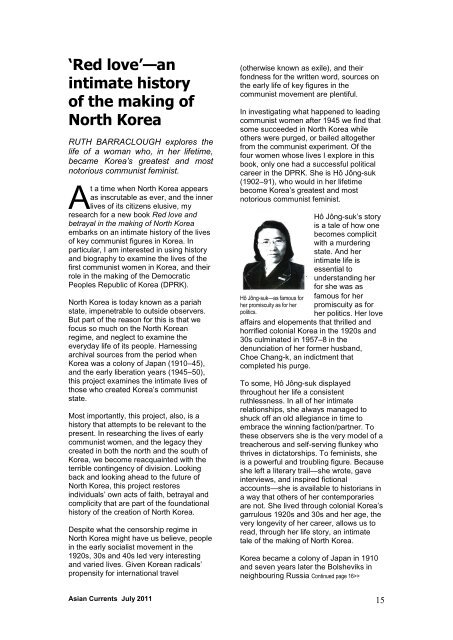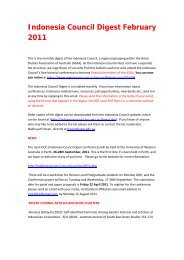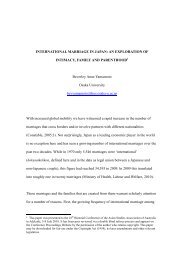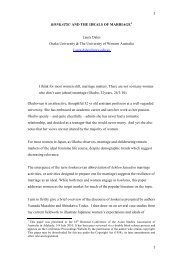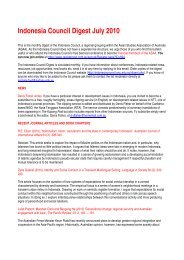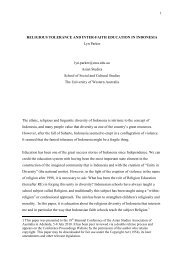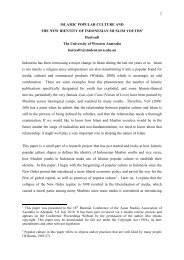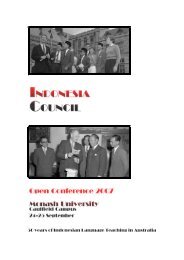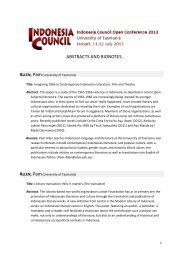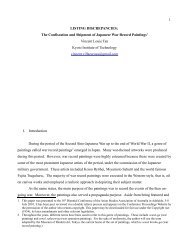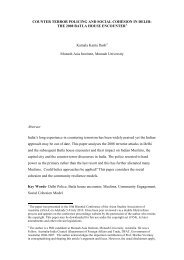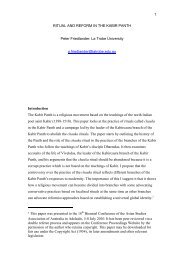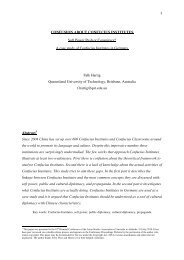Asian Currents - Asian Studies Association of Australia
Asian Currents - Asian Studies Association of Australia
Asian Currents - Asian Studies Association of Australia
Create successful ePaper yourself
Turn your PDF publications into a flip-book with our unique Google optimized e-Paper software.
‘Red love’—an<br />
intimate history<br />
<strong>of</strong> the making <strong>of</strong><br />
North Korea<br />
RUTH BARRACLOUGH explores the<br />
life <strong>of</strong> a woman who, in her lifetime,<br />
became Korea’s greatest and most<br />
notorious communist feminist.<br />
A<br />
t a time when North Korea appears<br />
as inscrutable as ever, and the inner<br />
lives <strong>of</strong> its citizens elusive, my<br />
research for a new book Red love and<br />
betrayal in the making <strong>of</strong> North Korea<br />
embarks on an intimate history <strong>of</strong> the lives<br />
<strong>of</strong> key communist figures in Korea. In<br />
particular, I am interested in using history<br />
and biography to examine the lives <strong>of</strong> the<br />
first communist women in Korea, and their<br />
role in the making <strong>of</strong> the Democratic<br />
Peoples Republic <strong>of</strong> Korea (DPRK).<br />
North Korea is today known as a pariah<br />
state, impenetrable to outside observers.<br />
But part <strong>of</strong> the reason for this is that we<br />
focus so much on the North Korean<br />
regime, and neglect to examine the<br />
everyday life <strong>of</strong> its people. Harnessing<br />
archival sources from the period when<br />
Korea was a colony <strong>of</strong> Japan (1910–45),<br />
and the early liberation years (1945–50),<br />
this project examines the intimate lives <strong>of</strong><br />
those who created Korea‘s communist<br />
state.<br />
Most importantly, this project, also, is a<br />
history that attempts to be relevant to the<br />
present. In researching the lives <strong>of</strong> early<br />
communist women, and the legacy they<br />
created in both the north and the south <strong>of</strong><br />
Korea, we become reacquainted with the<br />
terrible contingency <strong>of</strong> division. Looking<br />
back and looking ahead to the future <strong>of</strong><br />
North Korea, this project restores<br />
individuals‘ own acts <strong>of</strong> faith, betrayal and<br />
complicity that are part <strong>of</strong> the foundational<br />
history <strong>of</strong> the creation <strong>of</strong> North Korea.<br />
Despite what the censorship regime in<br />
North Korea might have us believe, people<br />
in the early socialist movement in the<br />
1920s, 30s and 40s led very interesting<br />
and varied lives. Given Korean radicals‘<br />
propensity for international travel<br />
(otherwise known as exile), and their<br />
fondness for the written word, sources on<br />
the early life <strong>of</strong> key figures in the<br />
communist movement are plentiful.<br />
In investigating what happened to leading<br />
communist women after 1945 we find that<br />
some succeeded in North Korea while<br />
others were purged, or bailed altogether<br />
from the communist experiment. Of the<br />
four women whose lives I explore in this<br />
book, only one had a successful political<br />
career in the DPRK. She is Hô Jông-suk<br />
(1902–91), who would in her lifetime<br />
become Korea‘s greatest and most<br />
notorious communist feminist.<br />
Hô Jông-suk—as famous for<br />
her promiscuity as for her<br />
politics.<br />
Hô Jông-suk‘s story<br />
is a tale <strong>of</strong> how one<br />
becomes complicit<br />
with a murdering<br />
state. And her<br />
intimate life is<br />
essential to<br />
understanding her<br />
for she was as<br />
famous for her<br />
promiscuity as for<br />
her politics. Her love<br />
affairs and elopements that thrilled and<br />
horrified colonial Korea in the 1920s and<br />
30s culminated in 1957–8 in the<br />
denunciation <strong>of</strong> her former husband,<br />
Choe Chang-k, an indictment that<br />
completed his purge.<br />
To some, Hô Jông-suk displayed<br />
throughout her life a consistent<br />
ruthlessness. In all <strong>of</strong> her intimate<br />
relationships, she always managed to<br />
shuck <strong>of</strong>f an old allegiance in time to<br />
embrace the winning faction/partner. To<br />
these observers she is the very model <strong>of</strong> a<br />
treacherous and self-serving flunkey who<br />
thrives in dictatorships. To feminists, she<br />
is a powerful and troubling figure. Because<br />
she left a literary trail—she wrote, gave<br />
interviews, and inspired fictional<br />
accounts—she is available to historians in<br />
a way that others <strong>of</strong> her contemporaries<br />
are not. She lived through colonial Korea‘s<br />
garrulous 1920s and 30s and her age, the<br />
very longevity <strong>of</strong> her career, allows us to<br />
read, through her life story, an intimate<br />
tale <strong>of</strong> the making <strong>of</strong> North Korea.<br />
Korea became a colony <strong>of</strong> Japan in 1910<br />
and seven years later the Bolsheviks in<br />
neighbouring Russia Continued page 16>><br />
<strong>Asian</strong> <strong>Currents</strong> July 2011 15


